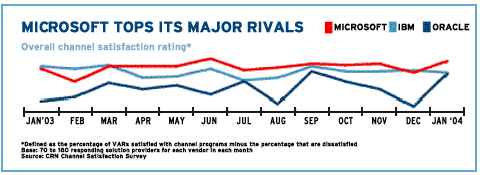On-Demand Era
The IGS incentives include an uncapped annuity on a percentage of sales throughout the life of the contract and a signing bonus for sales into small and midsize businesses. That could mean a 50 percent to 100 percent increase in incentives. IGS will also unveil a channel-ready, specially tailored managed hosting service for midsize businesses. IBM said the offering, which includes infrastructure solutions with server management, is similar to capabilities provided to IBM's Fortune 500 clients but with a special SMB price tag.

\
IBM's new on-demand initiatives 'are all designed to break down internal walls to enable Business Partners to sell complete solutions.'
--IBM's Mike Borman
Mike Borman, general manager of IBM Global Business Partners, said the new programs are just the beginning. "Throughout 2004, IBM will unveil new initiatives that will continue to enhance our support of Business Partners in the on-demand era," he said. "[They] are all designed to break down internal walls to enable Business Partners to sell complete solutions."
Partners will also get access to its Signature Selling Method eLearning Module,in effect allowing them to capitalize on the same sales methodology used by IBM's own sales force.
Furthermore, the company will give partners access to IBM Sales and Marketing Centers, enabling them to leverage a fee-based IBM offering aimed at helping identify and win business. Finally, IBM is launching an on-demand Innovation Centers Initiative that consolidates previously existing enablement centers to deliver a more integrated view of IBM on-demand solutions.
Joe Vaught, COO of PCPC, an IBM Business Partner in Houston, said the IGS offerings will help him sell more Linux clusters by letting the customer either expand existing computing power or try Linux before committing to it on a large scale.
"This is Linux by the drink," he said. "This is really the beginning of on-demand, grid computing for Linux. It should mean more money for me."
One of the most critical aspects of IBM's on-demand strategy is a stepped-up ISV assault. IBM's new ISV Advantage For Industries program targets ISVs with key expertise. Qualifying ISVs will be included on calls into corporate accounts where tailored solutions are crucial. The program provides even small application specialists with access to IBM's crown jewel accounts.
"We will recruit and attract thousands of ISVs, for banking, for telecom, retail %85 several hundred ISVs within each industry, and they will build to our on-demand road map with our middleware and servers," said Buell Duncan, IBM's general manager for ISV and Developer Relations.
IBM distribution partner Avnet Hall-Mark will also unveil at PartnerWorld an Enablement Services Partnership to help ISVs design, integrate and market IBM-based solutions and will offer its resellers access to its own custom ERP solution to help them more easily connect to the distributor.
Thus far, the focus of IBM's year-old ISV Advantage program has been the SMB space.
The upcoming changes could end what some see as a "ghetto-ization" of IBM's partner focus by offering small, but capable ISVs opportunities in large accounts. Initially, the program will target banking, financial markets, health care, life sciences, retail and telecommunications. IBM plans to add another six verticals later.
Some current IBM ISVs are excited at the prospect. "They've been adamant about not getting into the applications business and staying within the middleware, infrastructure arena," said Robert DeMaio, CEO of Relavis, a New York ISV.
The potential opportunity is huge. IBM now does about $14 billion a year in banking business, more than a quarter of which is from solutions, said Mark Greene, general manager of Global Banking Industry for IBM. "Solutions always include a partner application, along with IBM hardware, middleware and services," he added.

In addition, IBM will offer a "portal view" into its middleware portfolio and partner offerings in a way that makes sense to customers in specific industries. "That will be the entry point if you consider yourself in a particular industry," said Carol Kovac, general manager of IBM's Healthcare and Life Sciences Industry Group. That effort, which should make shopping for solutions easier by showing only relevant offerings, is part of IBM's new PartnerWorld Industry Networks for ISVs.
ISVs proving themselves loyal to IBM, as opposed to Microsoft, for example, could reap the rewards of association with IBM's brand, which is especially powerful in large accounts, said Laurie McCabe, analyst with Summit Strategies.
Clearly, the push for ISVs is not unique to IBM. "You'll also see increased effort by Sun, BEA, as well as IBM to mend fences with ISVs who have been getting pressured and squeezed," said Dana Gardner, analyst with The Yankee Group.
Analyst Shawn Willett of Current Analysis agreed but offered a caveat: "It's smart from IBM's perspective to get ISVs aboard, but [IBM has] to manage the competition between the ISVs and needs to put more thought into that."
IBM executives maintain that ISV vs. ISV conflict is not a major concern, but Willett and others beg to differ. "IBM wants ISVs to post blueprints for vertical solutions, but the problem is two ISVs who compete head-to-head won't want competitors to see their expertise," Willett noted.
CRAIG ZARLEY contributed to this story.